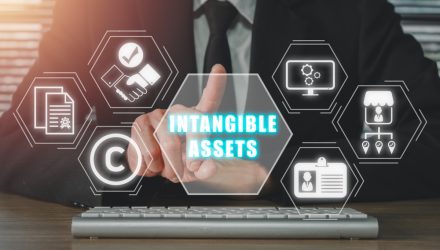Intangible assets have become increasingly important in the modern economy, yet many funds still prioritize book value.
Traditionally, businesses have been valued based on their book value, which is based on the amount of assets they have. Book value is simple: It generally looks at a company’s assets on its balance sheet over its liabilities. However, neither of these measures takes intangible assets into account.
Intangible assets are those that are not physical in nature. Well-known examples of intangible assets include research and development investments, copyrights, and brand value. For some companies, the value of their intangible assets may be significant.
The problem with sorting companies based on book value and effectively overlooking intangible assets is that many ripe investment opportunities and well-positioned companies might slip through the cracks.
Market Valuation Metrics
Many great companies don’t look as attractive from a book-value perspective. Their assets are largely intangible, making it hard to measure.
“We are increasingly in a knowledge-based economy,” said Todd Rosenbluth, head of research at VettaFi. “The value of many businesses are aligned with brand and patents, but this is often overlooked in market valuation.”
One great example is Google (GOOG). “Google’s algorithm is not a physical asset that one can easily put a value on. However, it’s obviously worth a significant amount. Google is an example of a company that doesn’t have a lot of physical assets but instead has a lot of cash flows”, stated by Michael Mack, Associate Portfolio Manager for VictoryShares and Solutions.
Another example of a company that doesn’t have a lot of tangible assets but is highly profitable is Qualcomm Inc. (QCOM). Licensing the patented designs of its chips to other chipmakers and receiving royalties through those licensing agreements is one way the company generates a profit.
Therefore, for investors who want to value companies properly, evaluating cash flow may be advantageous. Free cash flow considers intangibles, making it a more appealing valuation metric to many investors.
For more news, information, and analysis, visit the Free Cash Flow Channel.
Disclosure Information
All investing involves risk, including the potential loss of principal.
Portfolios managed by Victory Capital Management Inc. (VCM), including those managed by VictoryShares and Solutions included shares of Google and Qualcomm as of 2/12/2024. There can be no assurance that those securities remain in or out of the portfolios managed by VCM.
All information provided is for educational purposes only and does not constitute investment, legal or tax advice, an offer to buy or sell any security or insurance product; or an endorsement of any third party or such third party’s views. Whenever there are hyperlinks to third-party content, this information is intended to provide additional perspective and should not be construed as an endorsement of any services, products, guidance, individuals or points of view outside Victory Capital. All examples are hypothetical and for illustrative purposes only. You should obtain relevant and specific professional advice before making any investment or other decision. This material is based in part upon information from third-party sources that we believe to be reliable, but which has not been independently verified by us and, as such, we do not represent that the information is accurate or complete.
20240214-3384480

